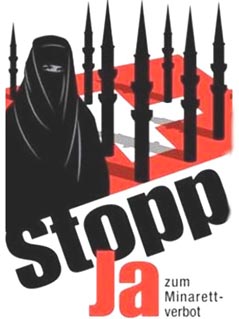
Swiss voters, at least those who bothered to show up at the polls, today voted to deny any future building of minarets in their country. As reported on Al-Jazeera:
Of those who cast votes in Sunday’s poll, 57.5 per cent approved the ban, while only four cantons out of 26 rejected the proposals.
The result paves the way for a constitutional amendment to be made.
“The Federal Council [government] respects this decision. Consequently the construction of new minarets in Switzerland is no longer permitted,” the government, which had opposed the ban, said in a statement.
The minaret is, of course, a symbol, but a rather unusual choice. In one sense it is like saying that MacDonalds cannot have a high sign (as is the case in some municipalities) but they can serve all the hamburgers they want. Thus, this ban is not on building mosques, nor does it prevent Muslims from praying in mosques. Since minarets long ago ceased to have functional value, apart from perhaps holding a loud speaker, the minaret is indeed symbolic.
But why the minaret? I suspect that this is a very Christian response, not unlike the centuries old designation of Islam as Mohammedanism. Since Church steeples are so emblematic in Christianity, it must be assumed that the minaret holds a similar position for Muslims. There is nothing in the Quran or traditions that mandates a minaret; just as Jesus never told his followers to build steeples. A minaret is also a visible difference for a building that may look “Middle Eastern” but otherwise would not stand out as much. So the vote does not really prevent Muslims from worship, but it does send a message. This message is an Islamophobic domino theory response, since the real issue is not about architecture (or any misguided birds who may occasionally fly into a minaret) but about assimilation. News reports indicate that the fears behind the vote (which was not exactly a landslide) are more about women in hijab, application of sharia law and, of course, fear of extremist terrorism. Ironically, most of the Muslims in Switzerland are from European contexts like the former Yugoslavia, not from areas where they are likely to be violent.
Over and over again the refrain is that Muslims do not fit into Swiss lifestyle. This is not the first time such ultra nationalist sensibilities have surfaced. The neutrality of Switzerland in world War II may have saved their country from Nazi invasion, but the price for that was official denial of entry to Jews fleeing the holocaust. The fact that Swiss banks facilitated Nazi accounts with the wealth stolen from German Jews is not to be denied. The point is not that Switzerland is a racist country, at least not any more racist than other European nations when it comes to certain kinds of others. The irony is that Swiss Muslims are not the holocaust denyers in the Iranian government, nor the Taliban militants battling in Swat, but individuals who on the whole have assimilated quite well into the cantons.
So this ban is really a slap in the face of Swiss Muslims and a bitter pill for Muslims the world over. A slap is not the same as brutal beating; it is not abuse in that metaphorical sense. But it is clearly intended as a message that Muslims are not deemed Swiss enough, as though Swiss culture can only accommodate certain kinds of worldviews. But I suspect this slap will be more damaging to Switzerland than to Swiss Muslims, who can still build mosques. The image of Switzerland has taken a beating.
Daniel Martin Varisco